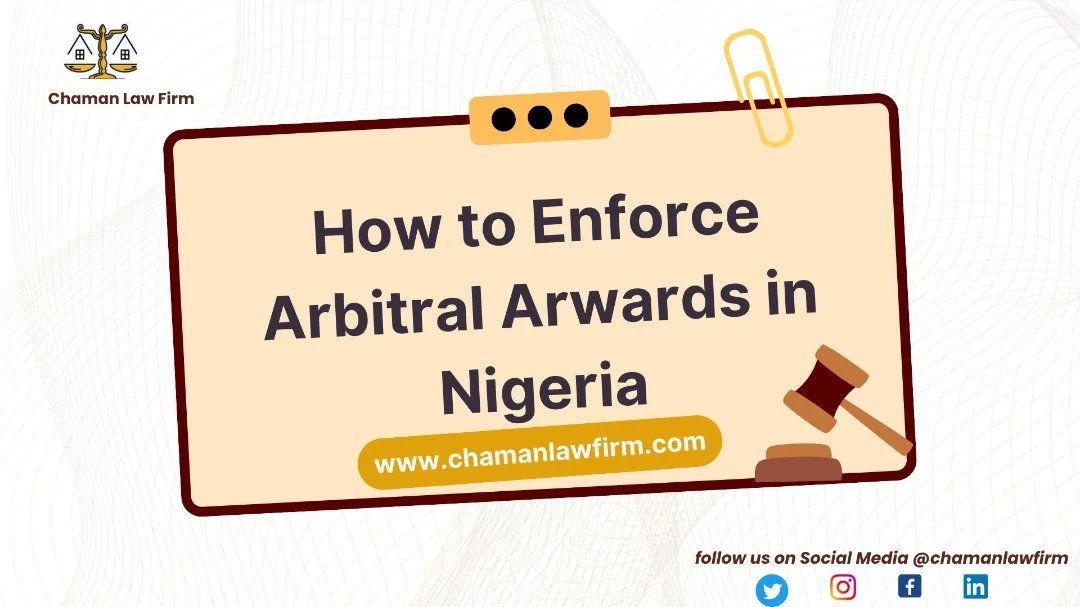How to Enforce Arbitral Awards in Nigeria
1. Introduction
Arbitration has increasingly become the preferred method of resolving commercial disputes in Nigeria due to its flexibility, confidentiality, and efficiency. However, the true value of arbitration lies not only in securing an award but in enforcing that award when the losing party fails to comply voluntarily.
This guide provides a thorough analysis of the legal framework, procedures, and practical considerations involved in the enforcement of arbitral awards in Nigeria.
2. Legal Framework for Arbitral Awards in Nigeria
a. Arbitration and Mediation Act 2023 (AMA)
This is the primary legislation that governs domestic and international arbitration in Nigeria.
b. New York Convention on the Recognition and Enforcement of Foreign Arbitral Awards (1958)
Ratified by Nigeria in 1988 and incorporated through Section 104 of the AMA.
c. Reciprocal Enforcement of Judgments Act (Cap R5 LFN 2004)
Used in some cases to enforce foreign awards where arbitration was followed by court confirmation abroad.
3. Types of Arbitral Awards Recognized in Nigeria
Domestic Arbitral Awards – Rendered under Nigerian law between parties within Nigeria.
International Arbitral Awards – Rendered in or outside Nigeria, involving parties from different jurisdictions.
Foreign Arbitral Awards – Rendered outside Nigeria under a different law or international arbitral institution.
4. Conditions for Enforcement of Arbitral Awards
To enforce an arbitral award in Nigeria, the following conditions must be met:
The award must be final and binding
It must be in writing and signed by the arbitrator(s)
The dispute must be arbitrable under Nigerian law
There must be no pending challenge to the award or such challenge must have failed
5. Jurisdiction and Venue for Enforcement
Arbitral awards are enforceable by filing an application before:
Federal High Court or
State High Court with jurisdiction over the subject matter
This applies whether the award is domestic, international, or foreign.
6. Procedure for Enforcement of Domestic Arbitral Awards
Step 1: File an Originating Motion
Accompanied by the Arbitral Award
Arbitration Agreement
Affidavit in support
Written address
Step 2: Serve the Respondent
The party against whom enforcement is sought must be served with the motion and supporting documents.
Step 3: Court Hearing and Judgment
The court reviews the documents, ensures due process, and may issue judgment in terms of the award.
7. Procedure for Enforcement of Foreign Arbitral Awards
a. Application for Recognition and Enforcement
Must be filed at the High Court with:
Duly authenticated original award
Arbitration agreement
Certified translations (if applicable)
b. Rely on the New York Convention or Reciprocal Enforcement Act
Choose the applicable legal route for enforcement depending on where the award was made.
8. Grounds for Refusing Enforcement
According to Section 58 of the AMA and Article V of the New York Convention, enforcement may be refused on grounds such as:
Party incapacity
Invalid arbitration agreement
Lack of proper notice
Award exceeds scope of arbitration
Irregularities in arbitral procedure
Award not yet binding or has been set aside
Enforcement would be contrary to public policy in Nigeria
9. Time Limitations
Enforcement of arbitral awards must be initiated within:
Six years for domestic awards under the Limitation Act
Varies for foreign awards depending on state law and application route
10. Enforcement vs. Challenge of Awards
It is common for losing parties to simultaneously apply to set aside an award while opposing enforcement. Nigerian courts must resolve any challenge before granting enforcement.
11. Role of Nigerian Courts in Enforcement
While Nigerian courts are generally arbitration-friendly, their roles include:
Determining the validity of the arbitration agreement
Ensuring procedural fairness
Protecting public interest and policy
12. Practical Tips for Successful Enforcement
Draft a clear and enforceable arbitral award
Ensure compliance with procedural rules
Serve respondents promptly
Respond swiftly to attempts to set aside the award
Engage experienced arbitration counsel
13. Case Law Illustrations
a. Kano State Urban Dev. Board v. Fanz Const. Ltd (1990) 4 NWLR (Pt. 142) 1
Confirmed enforceability of arbitration awards without full trial.
b. Baker Marine Nigeria Ltd v. Chevron Nigeria Ltd (2000) 3 NWLR (Pt. 681) 93
Established limits to court intervention.
c. Statoil (Nig.) Ltd v. NNPC (2013) LPELR-21874(CA)
Reinforced the binding nature of awards and court’s limited review role.
14. International Institutional Awards and Enforcement
Awards issued under institutions like:
ICC (International Chamber of Commerce)
LCIA (London Court of International Arbitration)
ICSID (International Centre for Settlement of Investment Disputes)
…are enforceable in Nigeria provided due process is followed and Nigeria is a signatory to the relevant treaty.
Conclusion
The enforcement of arbitral awards in Nigeria is legally grounded, procedurally detailed, and internationally aligned. While the Arbitration and Mediation Act 2023 and Nigeria’s commitment to the New York Convention facilitate enforcement, success depends on careful compliance, legal expertise, and timely action.
⚖️ Won Your Arbitration Case? Let Us Help You Enforce the Award in Court.
Securing an arbitral award is a victory—enforcing it is what secures your rights. Whether you’re enforcing a domestic or foreign arbitral award, the legal process in Nigeria can be complex and time-sensitive.
At Chaman Law Firm, we specialize in:\n
Enforcement of arbitral awards in Nigerian courts
Challenging or resisting enforcement where necessary
Navigating domestic and international arbitration protocols
Strategic legal representation from motion filing to judgment
📞Phone: 08065553671, 08096888818
✉ Email: chamanlawfirm@gmail.com
📍 Address: 115, Obafemi Awolowo Way, Allen Junction, Ikeja, Lagos, Nigeria
🌍Click here to learn more about Chaman Law Firm
Get results. Get enforcement. Partner with Chaman Law Firm today.
Chaman Law Firm – Your Right, We Protect.


